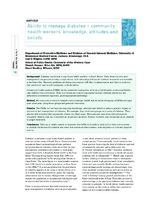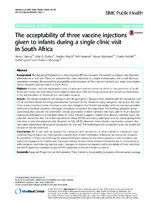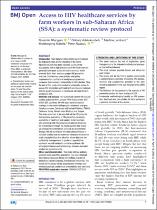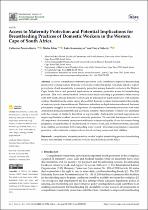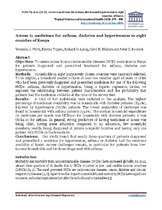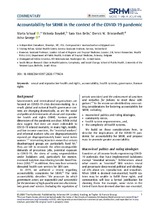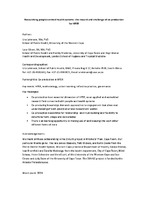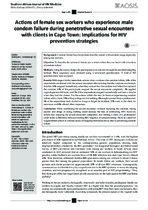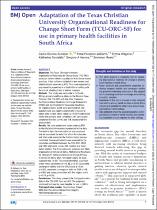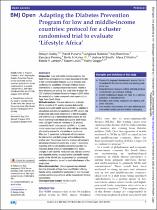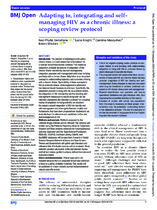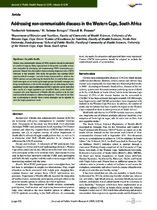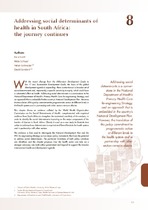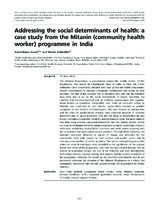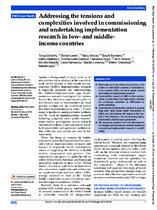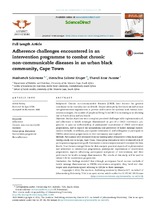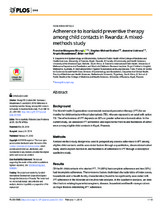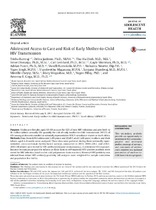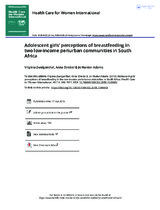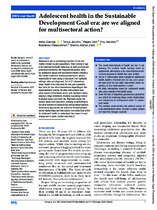Browsing School of Public Health by Title
Now showing items 1-20 of 804
-
Ability to manage diabetes – community health workers’ knowledge, attitudes and beliefs
(SEMDSA (Society for Endocrinology, Metabolism and Diabetes of SA), 2006)BACKGROUND: Diabetes constitutes a significant health problem in South Africa. Early detection and good management can prevent or delay complications, with national guidelines for diabetes treatment now available to ... -
The acceptability of three vaccine injections given to infants during a single clinic visit in South Africa
(BioMed Central, 2016)BACKGROUND: The Expanded Programme on Immunisation (EPI) has increased the number of antigens and injections administered at one visit. There are concerns that more injections at a single immunisation visit could ... -
Access to HIV healthcare services by farm workers in sub-Saharan Africa (SSA): A systematic review protocol
(BMJ Publishing Group, 2022)Sub-Saharan Africa (SSA) region harbours the highest burden of HIV infections in the world. Agricultural work has been reported as one of the occupations with a high prevalence of HIV. Farm workers generally have poor ... -
Access to maternity protection and potential implications for breastfeeding practices of domestic workers in the western cape of South Africa
(MDPI, 2023)Access to comprehensive maternity protection could contribute to improved breastfeeding practices for working women. Domestic workers are a vulnerable group. This study aimed to explore perceptions of and accessibility ... -
Access to medicines for asthma, diabetes and hypertension in eight counties of Kenya
(Wiley, 2018)OBJECTIVES: To assess access to noncommunicable diseases (NCD) medicines in Kenya for patients diagnosed and prescribed treatment for asthma, diabetes and hypertension. METHODS: Households in eight purposively chosen ... -
Accountability for SRHR in the context of the COVID-19 pandemic
(Taylor & Francis, 2020)Governments and international organisations are focused on COVID-19 crisis decision-making. As a result, global and national health governance contexts are changing dramatically, as are the social and political determinants ... -
Action learning for health system governance: the reward and challenge of co-production
(Oxford University Press, 2014-08-26)Health policy and systems research (HPSR) is centrally concerned with people, their relationships and the actions and practices they can implement towards better health systems. These concerns suggest that HPS researchers ... -
Actions of female sex workers who experience male condom failure during penetrative sexual encounters with clients in Cape Town: Implications for HIV prevention strategies
(AOSIS, 2017)BACKGROUND: Condom failure has always been found to coexist with condom usage, especially among sex workers. OBJECTIVE: To describe the actions of female sex workers when they are faced with situations of condom ... -
Adaptation of the Texas Christian University organisational readiness for change short form (TCU-ORC-SF) for use in primary health facilities in South Africa
(BMJ publishing group, 2022)Objectives The Texas Christian University Organisational Readiness for Change Scale (TCU-ORC) assesses factors influencing adoption of evidence-based practices. It has not been validated in low-income and middle-inc ... -
Adapting the diabetes prevention program for low and middle-income countries: Protocol for a cluster randomised trial to evaluate lifestyle Africa
(BMJ, 2019)Low and middle-income countries like South Africa are experiencing major increases in burden of non-communicable diseases such as diabetes and cardiovascular conditions. However, evidence-based interventions to address ... -
Adapting to, integrating and selfmanaging HIV as a chronic illness: a scoping review protocol
(BMJ Publishing Group, 2021)The process of adapting to a life with a chronic illness, is a well-researched phenomenon for a number of common chronic illnesses. The construct, adaptation, embeds the notions of integration of the chronic illness ... -
Addressing non-communicable diseases in the Western Cape, South Africa
(PAGEpress, 2019)Chronic non-communicable diseases (CNCDs) are increasing with grave consequences to countries’ development. The purpose of this study was three-fold: (1) to determine challenges PURE study participants faced regarding CNCD ... -
Addressing social determinants of health in South Africa: the journey continues
(Health Systems Trust (HST), 2017)With the recent change from the Millennium Development Goals to the 17 new Sustainable Development Goals, the focus of the global development agenda is expanding: there is attention on a broader set of social determinants ... -
Addressing the social determinants of health: A case study from the Mitanin (Community Health Worker) programme in India
(London School of Hygiene and Tropical Medicine, 2014)The Mitanin Programme, a government community health worker (CHW) programme, was started in Chhattisgarh State of India in 2002. The CHWs (Mitanins) have consistently adopted roles that ... -
Addressing the tensions and complexities involved in commissioning and undertaking implementation research in low- and middle-income countries
(BMJ, 2018)Rapid scale-up of new policies and guidelines, in the context of weak health systems in low/middle-income countries (LMIC), has led to greater interest and funding for implementation research. Implementation research ... -
Adherence challenges encountered in an intervention programme to combat chronic non-communicable diseases in an urban black community, Cape Town
(AOSIS OpenJournals Publishing AOSIS (Pty) Ltd, 2017)Background: Chronic non-communicable diseases (CNCD) have become the greatest contributor to the mortality rate worldwide. Despite attempts by Governments and various non-governmental organisations to prevent and control ... -
Adherence to isoniazid preventive therapy among child contacts in Rwanda: A mixed-methods study
(Public Library of Science, 2019)The World Health Organization recommends isoniazid preventive therapy (IPT) for six months for child contacts without tuberculosis (TB), who are exposed to an adult with active TB. The effectiveness of IPT depends on 80% ... -
Adolescent access to care and risk of early mother-to-child HIV transmission
(Elsevier, 2017)PURPOSE: Adolescent females aged 15–19 account for 62% of new HIV infections and give birth to 16 million infants annually. We quantify the risk of early mother-to-child transmission (MTCT) of HIV among adolescents ... -
Adolescent girls’ perceptions of breastfeeding in two low-income periurban communities in South Africa
(Routledge, 2019)In South Africa, exclusive breastfeeding rates are low, and rates of teenage pregnancy are high. Educational policy enables mothers’ return to school, which conflicts with policy emphasizing exclusive breastfeeding. We ... -
Adolescent health in the sustainable development goal era: Are we aligned for multisectoral action?
(BMJ Publishing Group, 2021)Adolescents are an increasing proportion of low and middle-income country populations. Their coming of age is foundational for health behaviour, as well as social and productive citizenship. We mapped intervention areas ...

